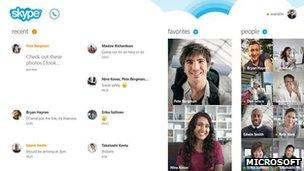Skype slashes battery use for Windows 8 system launch
- Published

Skype has been redesigned to work with Windows 8's touch interface
Skype's video chat software has been re-engineered to radically cut its energy use on the upcoming Windows 8 operating systems.
The application is designed to stop using the computer's central processing unit (CPU) when it is left to run in the background.
It means users can receive calls or instant messages without the risk of exhausting their laptop battery.
The move may help Skype compete against Oovoo, Google Talk and other rivals.
Microsoft bought Skype for $8.5bn (£5.3bn) last year.
Although it has integrated the product into its Outlook.com web email service, it will continue to offer Skype as a separate installable application on its new system, avoiding the risk of anti-competition complaints.
Cloud support
The new software works by suspending Skype's activity on an Windows 8 device within a minute of the user switching to another application.
Before the program stops making use of the processor, it registers its change of activity with Windows Push Notification Services (WNS) - software that runs on Microsoft's remote computer servers.
It then takes advantage of a feature built into modern computer chips, called Connected Standby.
This allows the computer to monitor incoming notifications without using much electricity.
Effectively, the machine is checking for news of an incoming call or message briefly once every 15 milliseconds before powering back down, rather than keeping connections to the user's peers constantly open.
If someone tries to contact the user, their action is recorded by Microsoft's servers, which then send a notification, reactivating Skype so it can handle the activity.
Skype's director of program management, Piero Sierra, said the facility would be offered on Windows 8 tablets and laptops first, and the firm's Windows Phone 8 smartphone system "soon", before coming to other platforms.
"Skype evolved on the desktop as a large application that maintains a connection with all of your peers," he told the BBC.
"This architecture was designed in a world where cloud services were not readily available, and it scales very well on desktops.
"But as our users are more and more connected to other mobile devices, battery life becomes a top consideration, and thus a service-based architecture like the one we are introducing makes a lot of sense."
Mr Sierra stressed that other software developers would also have access to Window's Connected Standby feature, meaning Skype's advantage might be short-lived.
Efficient apps
A similar notification-based facility is already used by several smartphone apps to cut power use. The editor of the Pocket-lint tech site said he hoped Skype's move would encourage the practice on larger devices.
"People don't want inefficient apps in the same way as they don't want an inefficient boiler in their house," Stuart Miles said.
"The idea that they have created an app that uses 0% of the CPU will make users more inclined to use it in the background.
"I would hope this becomes the norm because there is nothing worse than getting down to 10% battery life and having to find a power outlet to keep working."
- Published9 October 2012
- Published27 July 2012
- Published10 May 2011